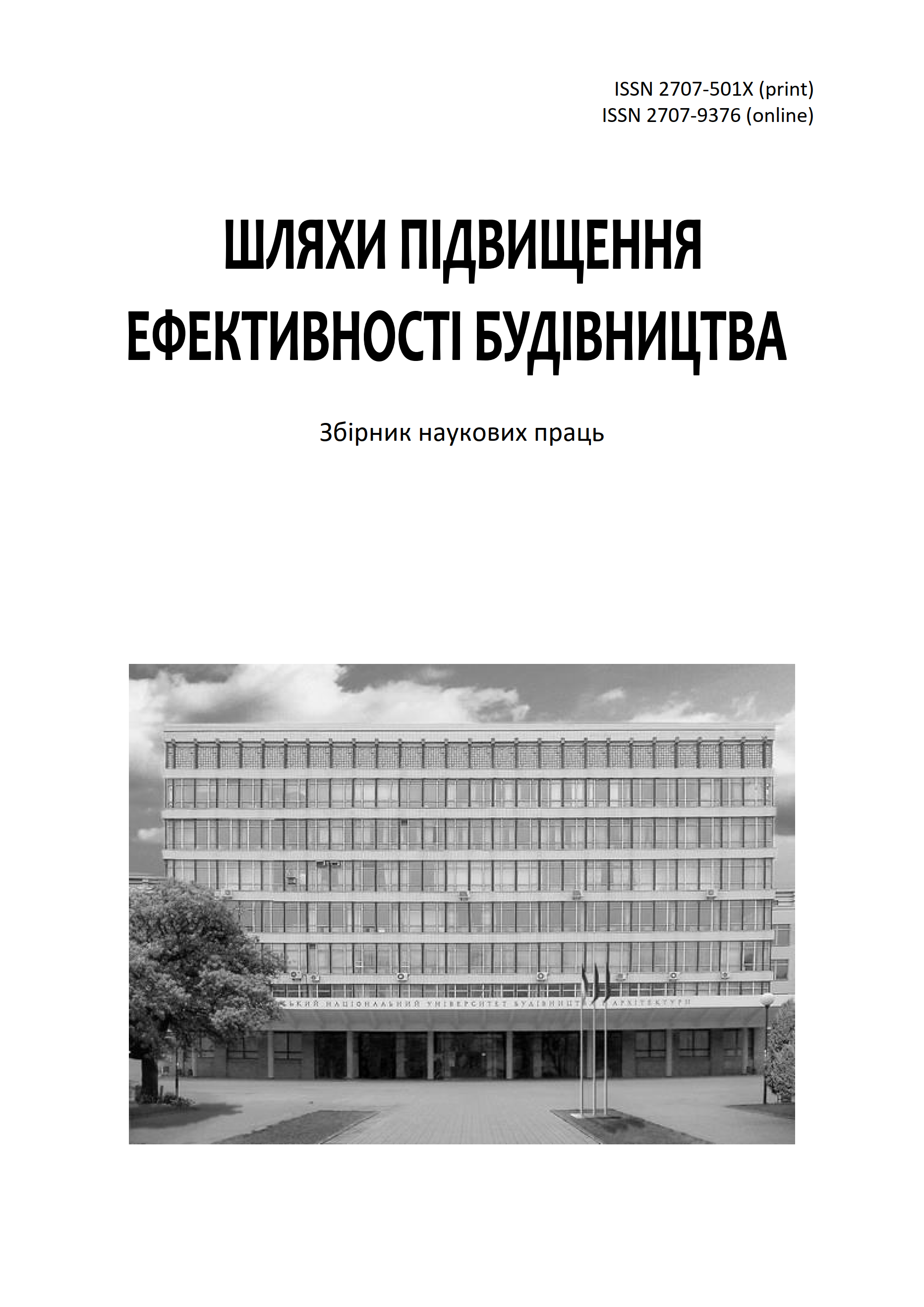Problems and methods of assessing the level of digital development of construction participants in a multiproject environment
Keywords:
construction, construction participants, multi-project environment, stakeholders, construction organization, digital interaction, digital environment, digital maturity, digital development, digital development evaluation methodsAbstract
Problems and methods of assessing the level of digital development of construction participants in a multiproject environmentSince the beginning of the war, the construction industry, along with the entire system of functioning of the country's economy, is undergoing significant transformations caused by military actions, structural changes, and digital technologies. Assessing the level of digital development of construction participants in a multi-project environment is a multifaceted and complex task, part of which is solved in the article. The main challenge of a multi-project environment is the diversity of construction projects, each with its own stakeholders, requirements and digital ecosystems. This diversity often leads to differences in digital development among participants, which hinders collaboration, efficiency, and project outcomes. Understanding and addressing these challenges is essential to foster alignment, integration and digital innovation across the construction ecosystem.Challenges in assessing digital development include interoperability issues, cultural resistance to change, and the lack of standardized assessment metrics. Interoperability problems arise due to the use of different software platforms and data formats, which prevents seamless collaboration and data exchange between construction participants. Cultural resistance to change, common in traditional construction practices, creates obstacles to the adoption of digital technologies and the introduction of new work processes. In addition, the lack of standardized indicators and evaluation systems makes it difficult to compare the digital maturity of projects and organizations.By addressing these challenges and using appropriate methodologies, construction stakeholders can navigate the complexities of digital development in a multi-project environment, encouraging efficiency, innovation and collaboration in the construction ecosystem. Digitization is essential to meet the growing demands of modern construction projects and achieve sustainable success in the digital age.
References
Z. Sriyolja et al (2021) Barriers to Implement Building Information Modeling (BIM) in Construction Industry: A Critical Review. IOP Conf. Ser.: Earth Environ. Sci. 738 012021 http://surl.li/kcqbr
Чуприна Х.М. Трансформація операційних систем управління будівельними підприємствами в умовах цифровізації економіки: теорія, методологія, практика:Монографія. –К.:ІПК ДСЗУ, 2020.- 347 с.
Tugai, O.A. et al. Organizational and technological, economic quality control aspects in the construction industry: collective monograph – Lviv-Toruń: Liha-Pres. 2019. 133 р.
Zeltser, R. et al (2019). Digital Transformation of Resource Logistics and Organizational and Structural Support of Construction. Nauka i innovatsii, vol. 15(5), 39-51
Бєлєнкова О.Ю. Цифрова трансформація будівництва: механізм взаємодії бізнесу, науки, держави. Будівельне виробництво. 2019. № 66. С. 30–36.
Зельцер Р.Я. Інноваційні моделі і методи організації, управління і економічної оцінки технологічних процесів будівельного виробництва: монографія. Київ: «МП Леся», 2018. 208 с.
Економетричний інструментарій управління фінансовою безпекою будівельного підприємства: монографія / за наук. ред. проф. Л.В. Сорокіної, проф. А.Ф. Гойка. Київ: Київський національний університет будівництва і архітектури, 2017. 404 с.
Tugay, O.A. et al Organization of Supervision over Construction Works Using Uavs and Special Software. Nauka i innovatsii, vol. 2019. 15(4), 23-32
Bielienkova, O. et al. Improving the Organization and Financing of Construction Project by Means of Digitalization. International Journal of Emerging Technology and Advanced Engineering.2022. Рр. 108-115
Belenkova, O. Yu. Digital transformation of construction and development of territories as an imperative for the formation of strategies of participants in the construction process. Urban planning and territorial planning, 2022. 81, 13–22.
Tsyfra T.Yu. BIM as a tool for reforming the pricing system (on the example of road construction enterprises in Kazakhstan). Ways to increase the efficiency of construction in the conditions of the formation of market relations. 2021. No. 47 (2). P. 168-180.
Боліла Н.В. Функціонально-операційна трансформація систем управління будівельним підприємством на основі CALS-технологій. Управління розвитком складних систем, 2019. 40 , 156-159.
Марченко О. І., Коляденко Р. С. Цифрова трансформація будівельного бізнесу: тенденції та перспективи. Цифрова економіка та економічна безпека. 2023. №. 4 (04). С. 20-26.
Литвинюк Є.І. Цифрова трансформація архітектурно-будівельного контролю. Актуальні питання у сучасній науці. 2023. № 10(16). С. 240-256.
Прозоре будівництво: відзначили три роки цифрової трансформації та роботи е-системи будівництва. Прозорість та підзвітність у державному управлінні та послугах. ТАПАС. URL: http://tapas.org.ua (дата звернення: 20.07.2024).
Шумак Л. В. Інновації та цифрова трансформація проектних підприємств в будівництві у VUCA-світі. Збірник матеріалів міжнародної науковопрактичної Інтернет-конференція «Стратегія організації VS реалії VUCAсвіту». К.: КНЕУ, 2021. С. 213-215.
Чуприна Х.М. Цифрова трансформація будівельних організацій на засадах інформаційного моделювання (BIM). Ways to Improve Construction Efficiency. 2018. №. 38. С. 178-189.
Клочко А. Цифрові технології в галузі архітектури і будівництва. Управління розвитком складних систем. 2021. №. 48. С. 61-68.
Фісуненко Н. О. Теоретичні аспекти розвитку цифрових трансформацій управління бізнесом компаній. Економіка, бізнес та управління 2023. Випуск 3 (40) С. 81-85.
Баранов О. А. Соціальна та цифрова трансформації: джерело правових проблем. Інформація і право, 2021, 3 (38): 59-73.
Чіков І. А. Цифрова трансформація економіки: сутність, проблеми, особливості. Підприємництво та інновації, 2022, 25: 97-102.
Downloads
Published
How to Cite
Issue
Section
License

This work is licensed under a Creative Commons Attribution 4.0 International License.
Authors who publish with this journal agree to the following terms:
- Authors retain copyright and grant the journal right of first publication with the work simultaneously licensed under a Creative Commons Attribution License that allows others to share the work with an acknowledgement of the work's authorship and initial publication in this journal.
- Authors are able to enter into separate, additional contractual arrangements for the non-exclusive distribution of the journal's published version of the work (e.g., post it to an institutional repository or publish it in a book), with an acknowledgement of its initial publication in this journal.
- Authors are permitted and encouraged to post their work online (e.g., in institutional repositories or on their website) prior to and during the submission process, as it can lead to productive exchanges, as well as earlier and greater citation of published work (See The Effect of Open Access).

